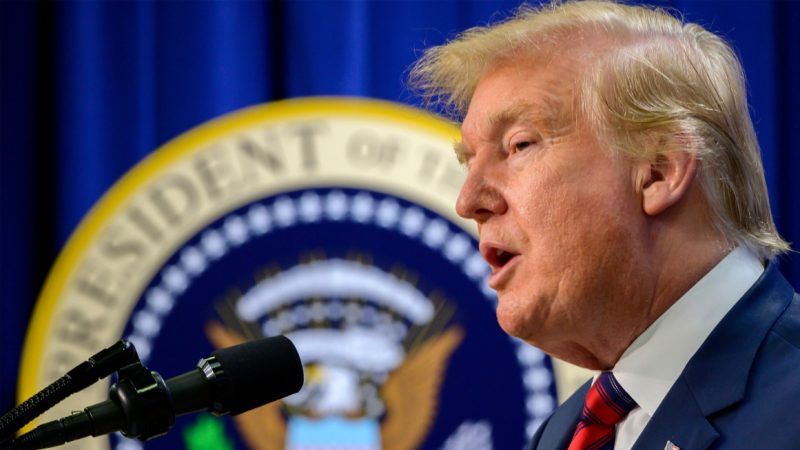Trump Will Win on DACA in the Supreme Court. He Should Cut a Deal Anyway.
What one executive does, another can undo.

The Supreme Court just agreed to hear whether President Donald Trump has the legal authority to scrap the Obama-era DACA (Deferred Action for Childhood Arrivals) program that allowed unauthorized Dreamers to live in the country without fear of deportation. (Dreamers are folks who grew up in the United States after they were brought to this country without proper authorization as minors.)
Will Trump win? Yes—and not because he has stacked the court with conservatives, although that won't hurt—but because DACA was done through executive action. And when it comes to immigration enforcement, Congress has given the president so much discretion that what one executive giveth, the other can taketh away!
Soon after assuming office, Trump not only eliminated Obama's program handing deportation relief to the parents of Dreamers—the so-called Deferred Action for Parental Arrivals (DAPA)—but also Dreamers themselves.
Getting rid of DAPA was less problematic because it got tied up in court before it was implemented. DACA, however, was different.
Of the 11 million or so undocumented folks in the country, some 5.5 million are Dreamers. And of those, 800,000 had already availed themselves of DACA. Under this program, applicants spent the first two years on "parole." That is, they got an official assurance that, if they lived crime-free, they would not be deported for two years, after which they could reapply for additional relief. Moreover, by law, people who get paroled were entitled to work permits and drivers licenses, so that they could get jobs and drive to them rather than become a drain on welfare. In fact, to obtain and maintain their DACA status, Dreamers were required to be gainfully employed or enrolled in school.
Although Trump scrapped the program, he delayed its termination by six months to give Congress time to pass a bill giving Dreamers permanent legal status. However, he made so many unreasonable demands in exchange for his signature on the bill—billions of dollars in his wall! mandating E-Verify! defunding sanctuary cities! cuts in legal immigration!—that Democrats balked and the whole effort went down in flames.
Meanwhile, two federal courts—the United States Court of Appeals for the Ninth Circuit and the Fourth Circuit—stepped in and barred Trump from ending the program (diminishing pressure on both sides to cut a deal). They also issued an injunction requiring the administration to keep the program intact while the appeals process played out, although they did allow it to stop admitting new Dreamers into the program. The Supreme Court twice declined the administration's request for a review, but finally relented this time around.
The reason Trump is likely to prevail in court is because a president enjoys vast discretion in setting enforcement priorities when it comes to immigration. Although only Congress can offer permanent legalization, the executive can choose whether to throw someone out of the country or hand them temporary parole to live in the country. It is almost entirely up to him or her.
This arguably means that just as Obama was within his rights to hand unauthorized immigrants deportation relief (contrary to the claims of many conservatives, as I wrote at that time), Trump is within his rights to take that relief away. To maintain otherwise would mean that Obama wasn't giving undocumented folks temporary relief but permanent legalization without congressional approval, which doesn't make any sense.
Even though Trump will almost certainly prevail in court, he shouldn't necessarily celebrate. The Supreme Court's ruling is expected in 2020 spring or summer. In other words, just a few months before the November elections. If the court gives him the green light to scrap DACA but he dithers in mass deporting Dreamers, he will lose face with his hardline restrictionist supporters whom he is trying to mobilize to the polls. However, if he does deport, he will inflame public opinion given that Dreamers are a highly sympathetic group. After all, two-thirds Americans support the legalization of Dreamers because they don't want to visit the "sins" of their parents on the children. Rounding up folks who have lived in America all their lives and deporting them to countries that they scarcely know won't make for good optics, to put it mildly.
Trump's best bet would be to cut a deal with Democrats on Dreamers before the court rules.


Show Comments (70)